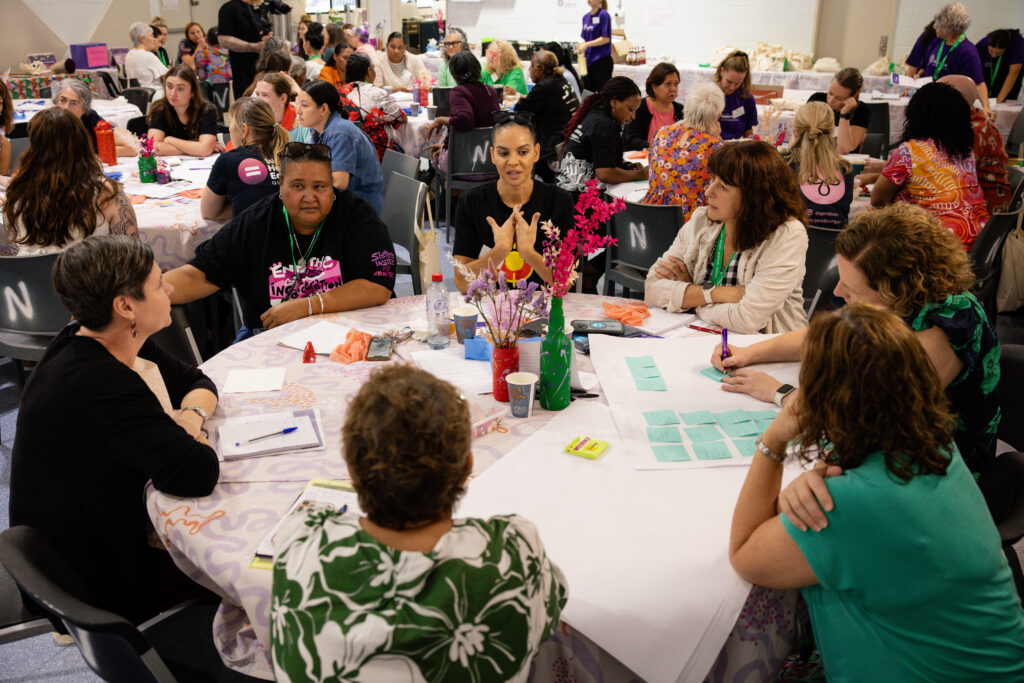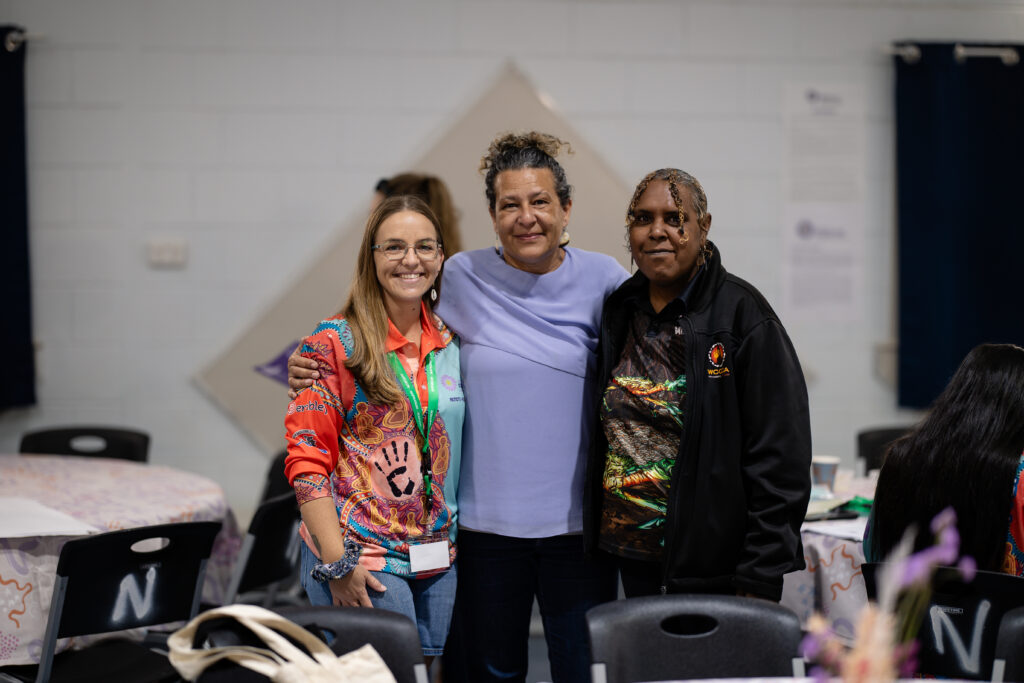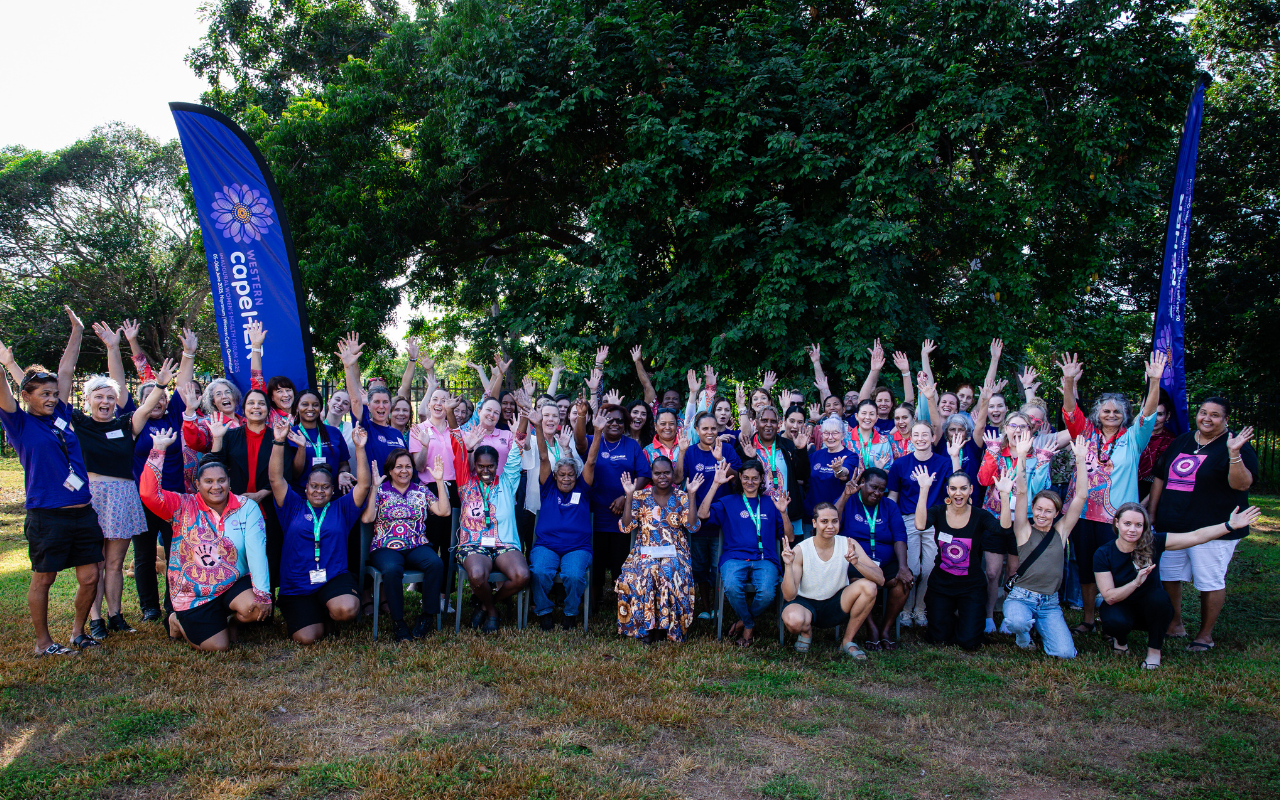Women from Weipa, Napranum, Aurukun and Mapoon came together on Alnigth land alongside nationally and internationally renowned health and human rights advocates to draw a line in the sand for health equity.
InSight+ journalist Becca Whitehead attended the Western CapeHER in Napranum, Far North Queensland, as Indigenous and non-Indigenous women reclaimed, and redefined, their own health journeys.
In a small town hall decorated with purple and orange flowers, in Napranum, Western Cape York Peninsula, around one hundred Indigenous and non-Indigenous women gathered to talk about health.
Professor Sandra Creamer AM is CEO of Australian Women’s Health Alliance (AWHA) and has worked with the former UN Special Rapporteur for Indigenous Peoples. When she spoke, a charge went around the room.
“Our health system is better than other countries’, but there are gaps. And those gaps show the missing link in health rights,” said Prof. Creamer.
“In Queensland, Aboriginal and Torres Strait Islander people have the greatest needs for health care, and they face the greatest barriers to accessing it. The new Queensland Human Rights Act 2019 states our rights to access health services without discrimination,” she said.
The fact that health services are now human rights written into Queensland law lit a fire under the delegates, in particular the local Indigenous women who see far too many loved ones and community members suffer, and die, from preventable diseases.
Maria Pitt is a traditional owner and Tjungundji woman from Mapoon. She marched in Cairns for land rights when she was a young girl. She felt empowered by the forum but keeps a rightfully wary perspective.
“Next time a doctor puts a stethoscope on me, I’ll be asking why, and what the results are,” she said.

A need for community-grown health solutions
Ms Pitt said the reason so many health programs don’t work is because they aren’t created by the community they are made for.
“The sugar-coating days are over. Most of the time it’s inappropriate how the services are delivered, and it doesn’t really meet the needs and wants of people living in the communities,” said Ms Pitt.
“Everybody needs that health care right across the board, but it’s not met at any level,” she said.
“Everything is built from the roof down. Until you allow the community to take responsibility, take ownership, and say to the rightful people, ‘Why aren’t you allowing us to have a seat and have a voice?’”
As women talked at the forum, many began to ask: if health is a human right for women, why does the breast screening van come around only once every two years?
A forum for all voices for health
Minnie King, a Kaurareg, Umaii and Kiwai woman, and respected businesswoman from Weipa in the Western Cape York Peninsula, created CapeHER from the ground up after having breast cancer herself, and seeing the devastating effects of a lack of available, timely and culturally sensitive health services in community, for both Indigenous and non-Indigenous women.
Discussions and visits to Western Cape communities regarding menstrual health began with University of Queensland’s Associate Professor Nina Lansbury in 2018, and more recently, in 2024 with UQ honours student Olivia Milsom undertaking further research on women’s health in the Western Cape, which was able to inform Western CapeHER to address health concerns and solutions.
After the success of the menstruation program “Mind Your Body” — which Minnie created with University of Queensland’s Nina Lansbury and Olivia Milsom — the women knew there was scope for more.
“CapeHER was a community-led, place-based forum, and our goal is to generate solutions together. This has been a rare opportunity to make our voices count,” said Ms King.
“We can’t maintain the status quo: this must be turned around. We know the only way that we’re going to do that, is if it comes from community. We can’t wait for policy makers and decision makers,” she said.
Minnie says that this is the first time a remote women’s health forum has been created in this way.
“This is the first time we’ve had a women’s health forum for remote women that’s had this much attention and been recorded as a historical moment,” she said.
“Indigenous people have always done this; the difference now is we have technology, flights, coordination – but Country heard it first,” said Ms King.

A different way of knowledge sharing
Ms King said that Western CapeHER was different because local women were as much a part of the knowledge sharing as the experts.
“Our on the ground local Community Advisory Committee was the key driver. We set the pace and made the decisions, from identifying the topics to approving speakers. We were speakers ourselves. Without the Committee, CapeHER wouldn’t have been what it was,” said Ms King.
The forum brought together over 28 health experts from throughout Queensland to learn and contribute to discussions about health issues and solutions for Indigenous and non-Indigenous remote women.
Delegates included locals, such as the Senior Medical Officer at the Weipa Hospital, Dr Jemma Nokes, the Palm Cockatoo Weipa Midwifery Group Practice (MGP) that provides in-community birthing after a 25-year hiatus. There were also nationally recognised researchers like Professor Creamer, and Kamilaroi woman and UQ Professor of Indigenous Health Research/NHMRC Research Leadership Fellow Professor Gail Garvey, who spoke about cancer and wellbeing outcomes for Indigenous peoples.
The gathered experts also included Women’s Health and Equality Queensland (WHEQ), Queensland Health, Apunipima Cape York Health Council, Torres and Cape Hospital and Health Service, CSIRO eHealth, Sisters Inside, and many other individual speakers including the local Community Advisory women who brought the forum together.
All speakers had equal time, and participated in group discussions, with researchers identifying and recording both challenges and solutions.
Ms King will be working with researchers from UQ and Queensland Health to present the knowledge and insight gained from Western CapeHER.
A strong academic partnership
Ms King has partnered with University of Queensland public health researcher Associate Professor Nina Lansbury for many years. A/Prof. Lansbury says that the grassroots nature of the forum is the key.
“We undertook interviews with local women to ask them what’s the best thing about their health, but also what are the challenges, and then what are their proposed solutions,” said A/Prof. Lansbury.
She said that the consultative process was designed to create an event that was explicitly what women in the community wanted.
“As a non-Indigenous person, I was required to really listen to the actual experts: those with lived experience. In academic settings the ‘expert’ is usually the researcher,” she said.
“The strength of this forum is that it was built from trusted relationships: it can’t be flown in,” she said.
Ms King says the forum can be reproduced in any other location.
“Any remote community in this country, I hope that they listen to this, I hope they see this. They can use this as a platform, a benchmark, and have a similar thing in their community,” said Ms King.
Breaking norms, leading to better outcomes
Prof. Creamer spoke again towards the end of the forum.
“Without us, no one would be here. That is who we are as women. But we can break into a million pieces. But we can be brought back by support, friendship,” said Prof. Creamer.
Ms King says that, as a remote living Indigenous woman, she sees this forum as breaking norms.
“At this forum, the individual voice became a collective voice, and individual tears became collective tears. That’s what Country saw and heard for the first time, here.”
Subscribe to the free InSight+ weekly newsletter here. It is available to all readers, not just registered medical practitioners.

 more_vert
more_vert
Very good to see this happening. Last year the Department of Regional Development Manufacturing and Water went out to remote Queensland to hear from indigenous people about water issues. This is a new way of building partnerships that is community driven instead of the failed top down approach. Since the change of government the focus has now shifted towards water security, also important for basic health support. But I’m not familiar anymore with the new approach, as my temporary job has come to an end.